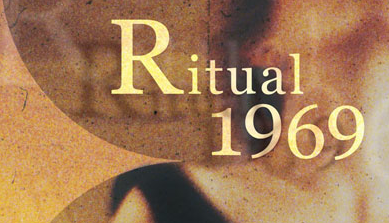John Lavin casts a critical eye over Jo Mazelis’ new collection of short stories from Seren Book, Ritual 1969.
There is an airless, hermetically sealed atmosphere to Ritual, 1969, the third short story collection from Jo Mazelis that is reminiscent of disorientating late 60’s / early 70’s British film masterpieces such as if… or The Shout. Works that were concerned with the strangeness lying beneath the apparently cloudless, cricket-loving, ever-so-regimented surfaces of British life. It is a book that evokes the tribulations of adolescence and young adulthood with an unsettling intensity which admirers of Mazelis’ previous works will be keen to reacquaint themselves with.
The female protagonists that inhabit these acutely observed stories of angst, lust and small town ennui are all players in a mystery that they cannot quite grasp the solution to. That mystery may be said to be our perception of what constitutes reality, and as such it may be said that the fabric of reality is being constantly probed and tested throughout a collection which, nevertheless, is happy to be as playful as it is philosophical. Indeed, the most obvious comparison to another writer would be to that other lover of equal helpings of the playful and the profound, Angela Carter. Mazelis, like Carter, is evidently attracted to fairy tale and folklore (think not so much of the directly folkloric Carter of The Bloody Chamber but more the bewitched and bewitching explorer of the everyday that wrote The Magic Toyshop and Nights at the Circus). She is interested in imbuing the page not just with quotidian pain and grit (all though there is plenty of that in these stories too), but also with what she perceives as being the innate magic and mystery that exists within the fabric of our lives.

Take the opening ‘Levitation, 1969’, for example. Mazelis examines the realities of day-to-day life (from a disturbed father prone to violent outbursts to a schoolgirl game of levitation) and finds that such scrutiny lends apparently minor or sad events an air of almost beguiling otherworldliness. The schoolgirl protagonist of the story half thinks the broken items that appear in the house are the result of a poltergeist:
The poltergeist at home is getting worse. Last night after she had gone to bed he tore the television set from the stand and jumped on it. She doesn’t know if he was careful to switch it off and take out the plug first. Probably, as he’s always telling them all to do just that.
But in a sense, of course, the father in these rages, has almost become like a poltergeist to his frightened daughter and Mazelis beautifully pinpoints the contrast between the two modes of the man:
the destruction was the work of an angry spirit; the reconstruction was performed by her father, who is often to be found with a soldering iron in his hand.
The girl neglects her schoolwork and is sporadically bullied, however, she enjoys the old game of levitation, for the weightless, almost out of body experience it gives her, and the story ends beautifully – perhaps more the way a poem might – on a moment of metaphorical transcendence:
They are lifting her, higher and higher, to waist level, then shoulder level, then above their heads… Then finally, although the other girls shade their eyes and search the sky they can no longer see her. She’s free.
In ‘Caretakers’, Mazelis takes this otherworldliness a step further, by deliberately playing with the Gothic tradition of works such as The Turn of the Screw and the The Haunting of Hill House. But while the unexplained recurrence of:
wet footprints… running in a line from the bathroom to the fireplace in her bedroom …far smaller than her own. Child-sized naked heel and toe marks…
ultimately lead to the story’s tragic denouement, it is really Mazelis’ depiction of the burgeoning romance between two unlikely, sensitive souls, holed up in a odd old house together, that is the centre of the story.
Mazelis draws her wounded, self-esteem-battered characters with a great deal of sensitivity and perhaps her writing is at it’s most striking in a story like ‘Biology, 1969’, a particularly direct vignette concerning a young English teacher who is groped by a man on the deserted upper deck of a bus:
The places where he’d touched her were all burning somehow, her breast, her bottom, her private parts. She wanted to rub at them, to rub and rub until his touch was expunged. Yet she also couldn’t bear the thought of touching where he’d touched and contaminated her.
This brief story – which concludes, incidentally, with two of the teacher’s male colleagues being blithely sexist about her – highlights the impact acts such as the one described have on their victims. It is a mini-masterpiece that takes something rarely talked about (and certainly something that was almost completely disregarded in the year of the story’s setting), something that the protagonist feels ‘shame’ about, and turns it into a diamond sharp work of art.
Ritual, 1969 is a subtle collection of considerable breadth and ambition that sees Mazelis take us into a world which is both familiar and yet at the same time somehow uncanny. By taking the reader out of their comfort zone she makes them look again and again at the familiar, making them realise that it was never quite what it seemed in the first place.
Ritual, 1969 is available from Seren Books.
John Lavin is a regular contributor to Wales Arts Review.











